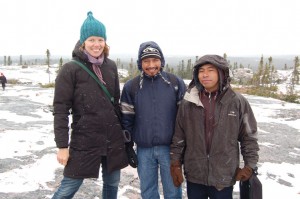Indigenous Engagements with Mining in Canada and Guatemala: Developing Refined Understandings through Collaboration and Comparison
In Canada, as in most of the rest of the world, the current boom in mining has disproportionally affected Indigenous peoples and territories. In some cases, Indigenous communities have welcomed extractive development on their lands, while in others, mining has been adamantly opposed. What explains Indigenous peoples’ contrasting modes of engagement with extractive industries?
Indigenous peoples’ positive engagements with mining are closely related to their being able to exercise their right to self-determination. But what elements allow for the expression of Indigenous self-determination in the context of a mining project? Our collaborative historical and ethnographic research project seeks to answer that question by documenting:
- what self-determination means from Indigenous perspectives;
- the roles that free and prior informed consent (FPIC) play from their points of view;
- how divergent historical experiences of externally led development have influenced these definitions; and
- the ways in which Indigenous peoples’ contrasting interpretations of self-determination relate to how they engage with extractive industries.

Building upon two-years of partnered research collaboration with representatives of the Cree Nation of Wemindji, Canada, and the Maya-Mam community of San Miguel Ixtahuacán, Guatemala, we are now exploring these various aspects of the issue of Indigenous self-determination in the context of a mining project by comparing Wemindji and San Miguel communities’ very different experiences with the same Canadian-owned mining company — Goldcorp, Inc. To do so, we are employing participatory action research (PAR) methodologies and integrated knowledge transfer (IKT) approaches while conducting oral history and ethnographic research in San Miguel and Wemindji. This, we hope, will allow us to produce locally relevant, actionable knowledge from these communities’ perspectives, as well as contribute meaningfully to the development and implementation of policies that will improve prospects for substantive forms of self-determination with mining-affected Indigenous communities.
Project Leader: Karine Vanthuyne
Project Co-Researchers: Catherine Nolin, Colin H. Scott, Daviken Studnicki-Gizbert
Associated Research Themes: Politics of Resource Extraction; Visual Methodologies
Program Affiliation: INSTEAD
